Seven heavy hitters in Hollywood share their experiences of being Catholic in the movie industry.
When I moved to Los Angeles, I discovered that the general perception about Hollywood by people outside Southern California is of glamorous celebrities, powerful studio executives, Beverly Hills, and, of course, the Oscars, but not necessarily a place where faith informs entertainment. I meet people who believe that Hollywood is anti-religious or pushing agendas contrary to a Christian worldview, a creator of cultural artifacts that demean the human person and destroy morals.
There are definitely those elements present, but it is not the case for every film set or person working in the industry. There are many whose faith informs their craft; they want to make a difference by telling stories that uplift and inspire.
Hollywood, and the industry it represents, is a place where art, creativity, and storytelling come together. It is also a place populated by searchers. “Despite what people say or think of Hollywood . . . it is a very spiritual place,” says Theodore “Ted” Melfi, film writer, director, and producer (Hidden Figures, St. Vincent). “It’s a very soulful place and people; especially in California, Los Angeles, and Hollywood [people] are always searching.” What are they searching for? We all seek purpose, meaning, communion, and intimacy that this world cannot satisfy. Ultimately, we are all seeking the spiritual, the supernatural, God.
Among the searchers in Hollywood are those whose art expresses their faith experience and learned values. I meet many of them at press junkets, red-carpet events, and film screenings. When I tell them that I pray for them and that there is a group of religious sisters who pray for all media professionals (the Paulines), they are flabbergasted. Many describe their heartfelt gratitude for these prayers, saying, as Harrison Ford did at a press junket for The Call of the Wild: “I so appreciate that. More than you know.”
Many seek spirituality and find it in their Catholicism. I asked a selection of known practicing Catholics in Hollywood what they love most about their faith, what it means to their craft of film or television, and what challenges they face being Catholic in the industry.
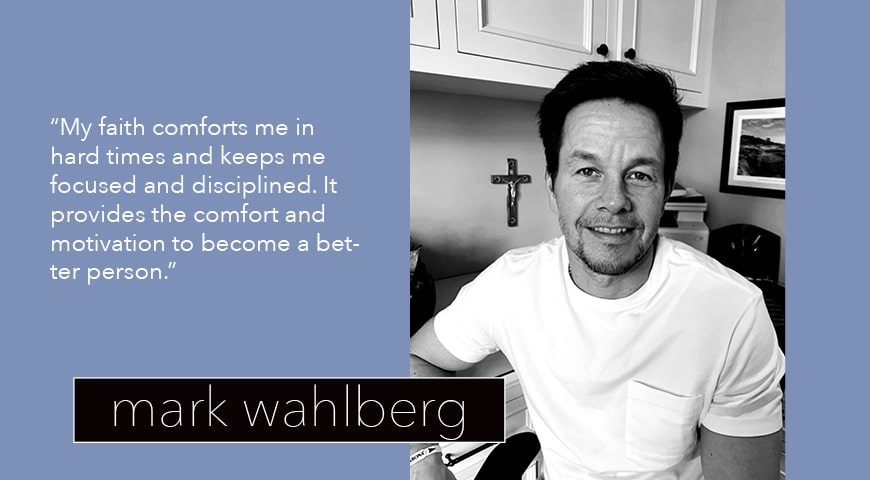
Best known for his role in The Fighter alongside Christian Bale, and as Sergeant Dignam in Martin Scorsese’s The Departed, actor and producer Mark Wahlberg says, “I hope God is a movie fan!” His viral Instagram posts show him going to church and thanking priests for their service to the people of God. “My faith comforts me in hard times and keeps me focused and disciplined,” Wahlberg says. “It provides the comfort and motivation to become a better person, a better father, a better husband, and to be an example.”
His faith leads him to inspiring stories. “Certainly the things that I usually gravitate toward most are the true stories and things that people find inspiring. I’m on this mission to make this movie about Father Stuart Long,” he adds. A former boxer and actor, Long miraculously survived a serious motorcycle accident, then became Catholic and later was ordained a priest. He died in 2014 at the age of 50 from a rare autoimmune disease.
Wahlberg calls the story “something that would challenge me as an actor but really have a huge impact on society as a whole. Like The Fighter, it will be one of those movies well worth the uphill battle to get the story and script in great shape and then the best version of the movie. It’s something I’ve been very passionate about for quite some time.”
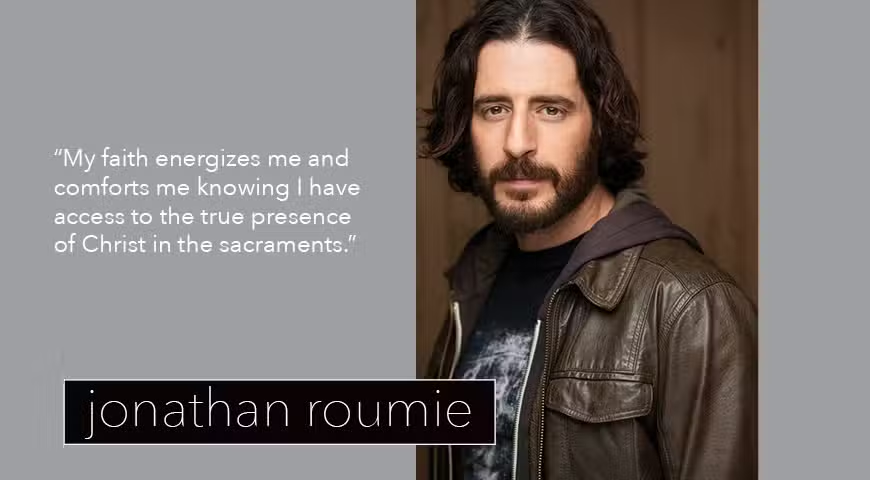
Actor Jonathan Roumie, most recently known for his role as Jesus in the crowdfunded streaming series The Chosen, says, “My faith energizes me and comforts me knowing I have access to the true presence of Christ in the sacraments.” His faith informs his character acting as well. “The roles I get and am drawn to are characters that are challenged but have a good heart.
“I bring all of who I am,” he says. “I bring an authenticity and genuineness to the role, and I accept people for who they are and try to understand them and be compassionate.” Playing Jesus in The Chosen, Roumie says, “is the preeminent honor not only of my career, but of my life.” However, in any role he brings the depth of his faith to his craft. “As an actor, I love being able to create. It is an opportunity to grow closer to the Divine, the Master Creator.”
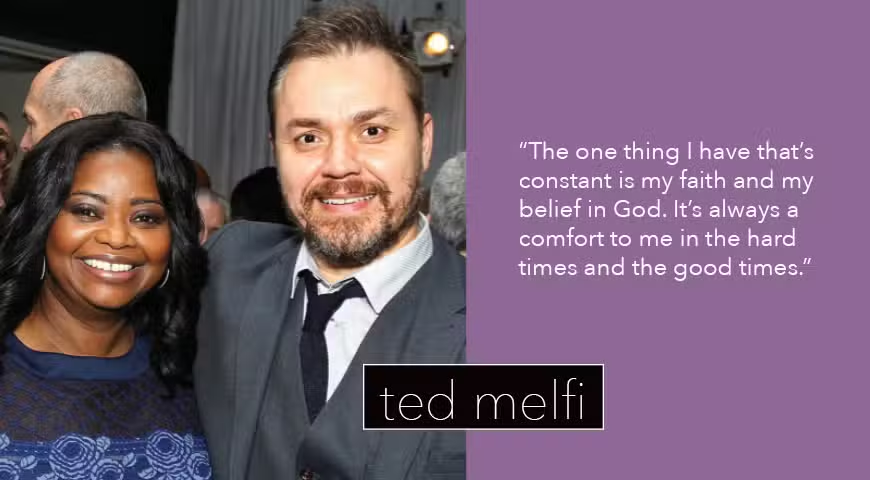
Not only does faith give meaning and purpose to life as an artist, but it is also the one constant element. As Ted Melfi says: “Relationships, friends, projects, business, the 10,000 things, they come and go. The one thing I have that’s constant is my faith and my belief in God. It’s always a comfort to me in the hard times and the good times, and I can always lean on it.” For Melfi, a writer, director, and producer, character development provides the heart of any engaging story. “I think I am always searching for a character’s faith internally and, in some fashion, what drives them and what allows them to do what they do, what makes them rise higher than they are as humans,” he says.
Melfi directed The Starling, a Netflix release earlier this year. Melissa McCarthy and Chris O’Dowd portray a married couple who suffer intense hardship, and the film gently reveals how every person deals differently with grief. As Jack (O’Dowd) seeks professional help, Lily (McCarthy) keeps busy with work and home. Every time she goes outside, a pesky starling attacks her to the point that she becomes obsessed with eliminating the perpetrator.
In a comedic way, the starling becomes the catalyst for Lily’s journey to acknowledge and confront the realities of life. Every character learns intrinsic value, even if the change is small. “And it’s the small change that means the most,” Melfi explains. “That’s the value we all have in God and God has for us. . . . We are all his children, and so we all have that inborn value, and that’s what I really love to find in the character and let the character discover their own value.”
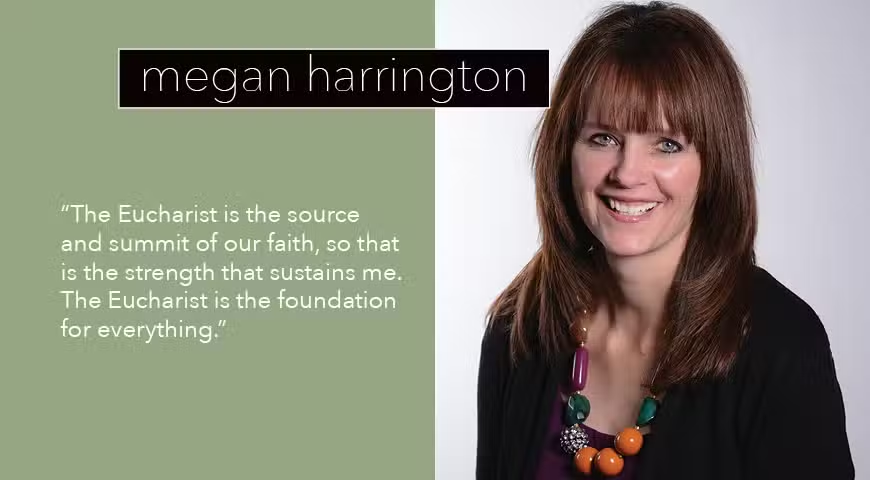
The documentarian writer and producer of The Dating Project and Pray: The Patrick Peyton Story, Megan Harrington says: “The Eucharist is the source and summit of our faith, so that is the strength that sustains me. The Eucharist is the foundation for everything.” Her story of Father Peyton, known as the “Hollywood Priest,” shows him wholly devoted to the Eucharist and Mary as he developed rosary crusades including the catchphrase “The family that prays together, stays together.” The film shows this man dedicated to bringing Christ to the culture and befriending many celebrities.
Documentarians seek the true story that lifts our spirits to see the good in the world or the harsh realities that need our attention. “My job is not to convert anybody,” says Harrington, “but in stories . . . even if God is not present [directly] . . . there is a truth and beauty . . . [we] are telling.”
She codirected and coproduced her newest film, The House That Rob Built, a story about a women’s college basketball coach in Montana in the 1970s. The film says nothing about faith, but the sense of belonging provides for a spiritual experience. “There is something beautiful about that value that sports can do, but there’s no mention of faith; there doesn’t have to have mention for it to be there.” She says that faith “is the very essence of who I am, so I can’t separate it.”
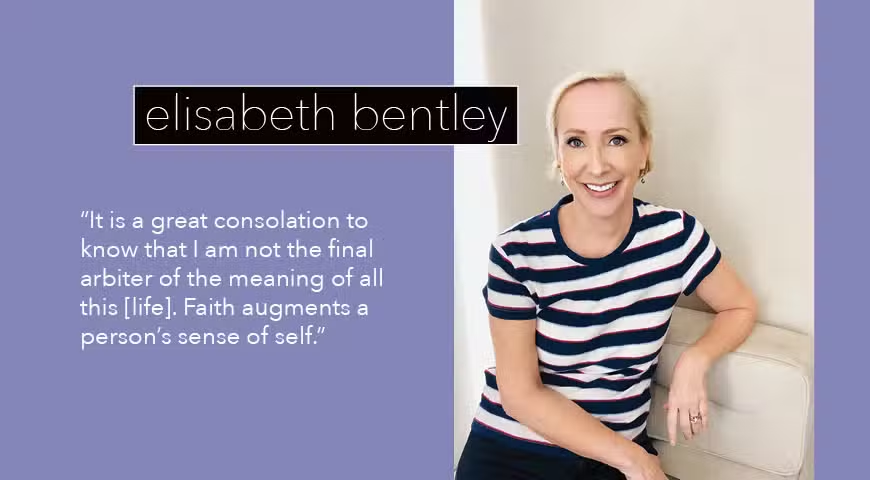
Faith is a foundation for many Hollywood professionals. Elisabeth Bentley, producer of A Hidden Life, a film about World War II conscientious objector Blessed Franz Jägerstätter, says: “It is a great consolation to know that I am not the final arbiter of the meaning of all this [life]. Faith augments a person’s sense of self. It gives one a more open perspective because it is the onus of the artist to think they have to have the final answer.”
Jägerstätter was a lifelong, devout Catholic farmer in rural Austria. When he was drafted into the army, he refused to take the oath of allegiance to Adolf Hitler and the Third Reich and was sentenced to death. He was declared a martyr and blessed by the Catholic Church on October 26, 2007. Bentley says, “The more truthfully we represent the human experience as on a path of redemption, the more true we are to ourselves.”
Though it took her more than a decade to get A Hidden Life made, she reflects on the experience this way: “Having a Catholic perspective and understanding broadens us because we see beauty, freedom, and truth in the here and now. . . . It gives us perspective, because the Catholic experience leaves more ranges of gray to the human story.”
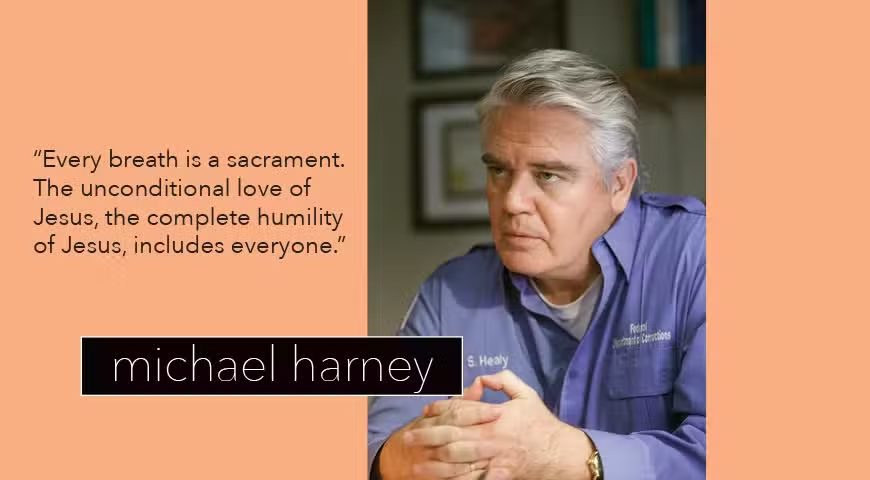
For many Catholic artists in Hollywood, their faith comes from the depths of who they are and gives life to characters, challenging all of us to reach for transcendence through everyday circumstances.
Actor Michael Harney (Project Blue Book, Orange Is the New Black) says that the foundation for his craft is the belief that “every breath is a sacrament. The unconditional love of Jesus, the complete humility of Jesus, includes everyone, and so you can say that after I do the technical things of learning lines and figuring it out . . . I always come to a place of: Where is the heart of Christ in what I am doing?”
As he creates the character, even if it’s someone who acts without a conscience, he reflects: “Then it’s an opportunity to experience an individual without a conscience. Then it’s an opportunity for me to go in that lost place and have an organic experience what that might be like. So, that, in that way, it’s an act of compassion.”
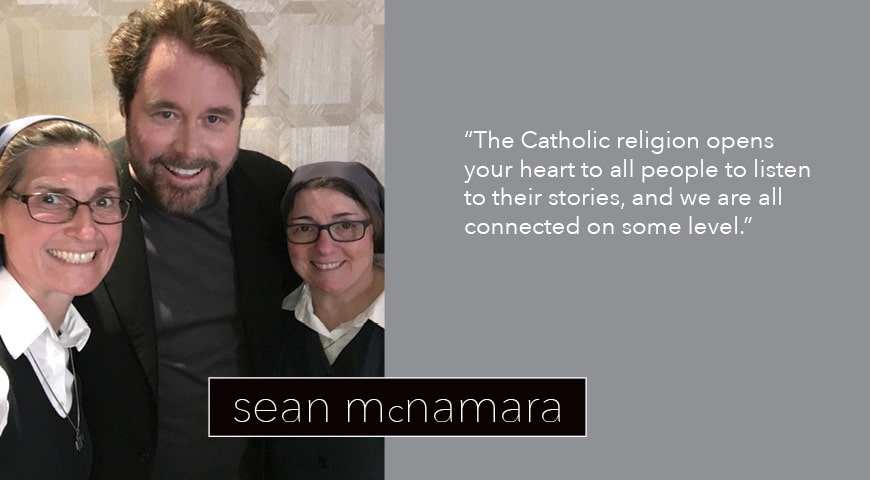
With 16 years of Catholic education education and Jesuit training along with a devout Irish Catholic mother, Sean McNamara feels his Catholicism is well embedded in him. Everything goes back, he says, “to love God above all and treat everyone as you want to be treated.” The producer, writer, and director of numerous teen television shows and films (That’s So Raven, Soul Surfer, The Miracle Season) says: “I have a sense of fairness on the set. I just try to talk to my actors and my crew, and it’s definitely not like Hollywood, or the version of what people think Hollywood is.
“My sets are really nice and quiet, and people can bring up their ideas and feel free to float ideas . . . and then we talk about it. It’s a really nice environment for expression.” Even though he does some films that have faith values, he tries to address the larger audience, because “I think good values apply to everybody. Catholics don’t like to be banged over the head by being preached to in a movie, but if you can insert it organically, I think it really works, and that’s what I try to do.”
His next film expresses these values as well. An Artist at War traces the lives of a Jewish couple, Joseph and Rebecca Bau, during World War II when they were helped by Oskar Schindler. They fell in love in a death camp, lost each other, survived Auschwitz, and found each other again. McNamara says: “The Catholic religion opens your heart to all people to listen to their stories, and we are all connected on some level. This is a definite departure from Soul Surfer, which is a Christian story, but now I’m finding this Jewish couple and telling their story.”
Is There Faith in Hollywood?
Most of the artists responded that they do not face any particular opposition for being Catholic in the industry. Wahlberg says, “It’s never been an issue, and I still have a great connection to many other people in Hollywood who are Catholic and love the Lord.” As McNamara says, “That’s what has allowed me to survive in this business . . . just kind of being open to what everybody else says, but also let them know my opinion and what I think.”
Harrington suggests, “We need to talk about the things that bring us together and not the things that bring us apart.” If your story is profoundly human, says Bentley, and it “resonates with something deeper, that’s what Hollywood is looking for.”
Hollywood is a place of searchers. It is the place where people of faith tell stories that resonate with the wider human experience. Though they may be few, as Catholics, these artists see that faith informs every aspect of their lives‚ and especially their craft of filmmaking and television production‚ in real but subtle ways. They seek to tell stories that are profoundly human and do so with great depth coming from their own lived faith experience.
Melfi says: “I find that Jesus’ best work was his parables, and he told stories in parables. And that’s what great filmmaking does. Great filmmaking tells the story of the parables and gives you a message without you ever knowing you got a message.”


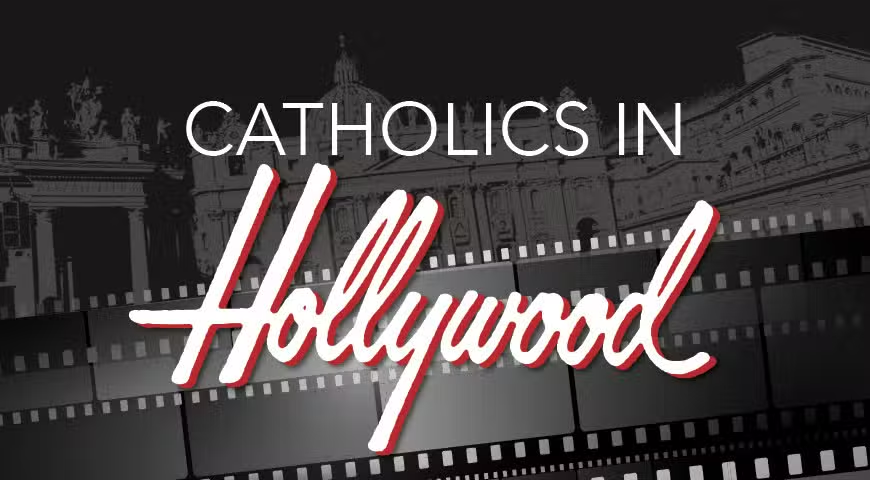

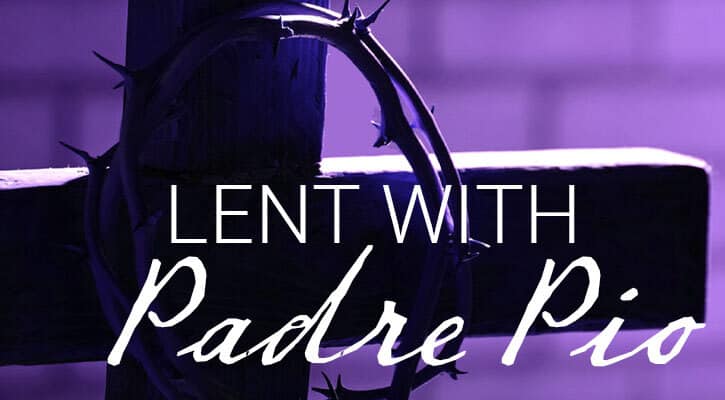


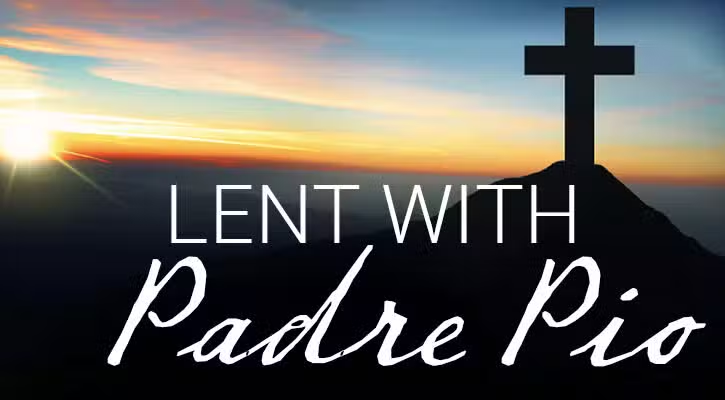

1 thought on “Catholics in Hollywood”
Jonathan Roumie’s keynote speech at the 2023 March for Life was so moving that I hope it softens the hearts of the pro-choice supports. His speech should be read during the homily at all Masses. May God bless Jonathan and his whole family!
Comments are closed.